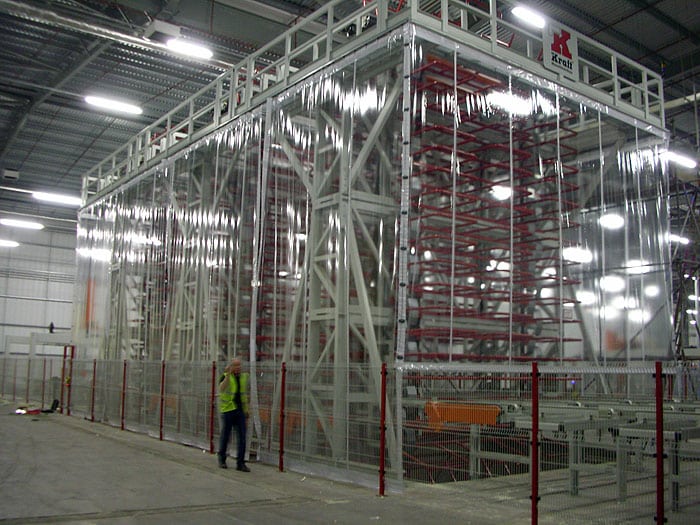Call 1300 799 969 | Contact Us


Home » How noise reduction can increase workplace safety in food manufacturing
In the fast-paced world of food manufacturing, prioritising employees’ health, safety, and productivity is crucial. Regulatory bodies such as Safe Work Australia and the Australian Food Standards Code have established stringent guidelines to safeguard the wellbeing of workers and consumers alike.
While noise reduction may not immediately come to mind when considering workplace safety, its impact should certainly be noticed. This article delves into the importance of noise reduction in food manufacturing, and highlights how it can contribute to a safer and more productive work environment.
Food manufacturing facilities often produce excessive noise from machinery, equipment, ventilation systems, and production processes. Prolonged exposure to high noise levels can harm workers, including hearing loss, communication difficulties, and increased stress levels.
Moreover, excessive noise can impair concentration and decrease productivity, leading to potential safety hazards. Recognising these risks is crucial for food manufacturers to prioritise noise reduction in their operations.
Safe Work Australia, the primary national policy-setting body for workplace health and safety, provides comprehensive guidelines for managing noise in the workplace. Manufacturers must adhere to these regulations to protect their employees’ wellbeing.
Under the model Work Health and Safety (WHS) laws, employers have a duty of care to ensure workers’ health and safety, including implementing measures to reduce noise exposure. Compliance prevents legal consequences and fosters a culture of safety within the organisation.
Implementing effective noise reduction measures offers several benefits that enhance workplace safety in the food manufacturing industry, including:
Exposure to high noise levels can lead to irreversible hearing damage. By reducing noise levels, manufacturers can safeguard their employees’ hearing health and prevent long-term health issues.
Excessive noise can hinder effective communication, making it challenging for workers to relay important safety information or warnings. Clear communication can be maintained by reducing noise, which enables timely responses to potential hazards and improves situational awareness.
High noise levels can create distractions and decrease concentration, increasing the likelihood of errors and accidents. By reducing noise, workers can focus better on their tasks, enhancing productivity and reducing safety risks.
Continuous exposure to excessive noise can cause fatigue and stress, leading to decreased alertness and increased accident rates. Implementing noise reduction measures helps create a calmer and more comfortable work environment, promoting employee wellbeing and reducing the potential for stress-related incidents.
Food manufacturers can employ several strategies to achieve noise reduction effectively:
Implementing engineering controls, such as noise enclosures, sound barriers, or vibration isolators, can help mitigate noise at its source. This approach minimises noise emissions and limits workers’ exposure to high noise levels.
Introducing policies and procedures to limit noise exposure – such as job rotation or scheduling breaks in quieter areas – can reduce the duration and intensity of noise exposure.
In situations where noise reduction at the source is not feasible, providing appropriate hearing protection such as earplugs or earmuffs is essential to minimise the risk of hearing damage.
To ensure a comprehensive approach, noise reduction should be integrated into a broader safety management system. Encouraging open communication channels, conducting regular noise assessments, and providing employee training on the importance of noise reduction can foster a safety-focused culture within your organisation.
In the food manufacturing industry, prioritising workplace safety is of utmost importance to protect employees and ensure productivity. While noise reduction may not always be the primary concern, its significance should not be underestimated.
By adhering to the guidelines set by Australian regulatory bodies and implementing effective noise reduction strategies, food manufacturers can mitigate the risks associated with excessive noise. Creating a safer and healthier work environment ultimately contributes to improved employee wellbeing, enhanced productivity, and compliance with regulatory requirements.
With our extensive experience in noise control solutions for the food manufacturing industry, Flexshield can provide valuable assistance in recommending suitable products such as acoustic enclosures, acoustic doors, acoustic louvres, and PVC screening solutions. These solutions address industrial noise control and offer contamination control, all of which benefits businesses in the food manufacturing sector.
By implementing comprehensive noise reduction measures, food manufacturers can prioritise workplace safety, protect their employees’ wellbeing, and ensure regulatory compliance, thus fostering a culture of safety and productivity.
For expert advice on the right noise control solutions for your facility, please contact Flexshield at
1300 799 969 or get in touch online.